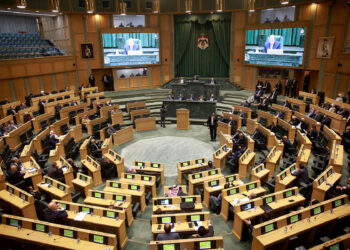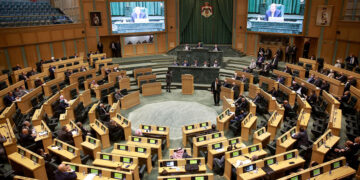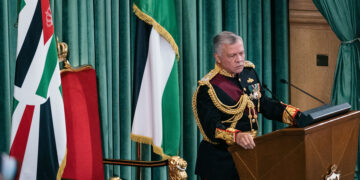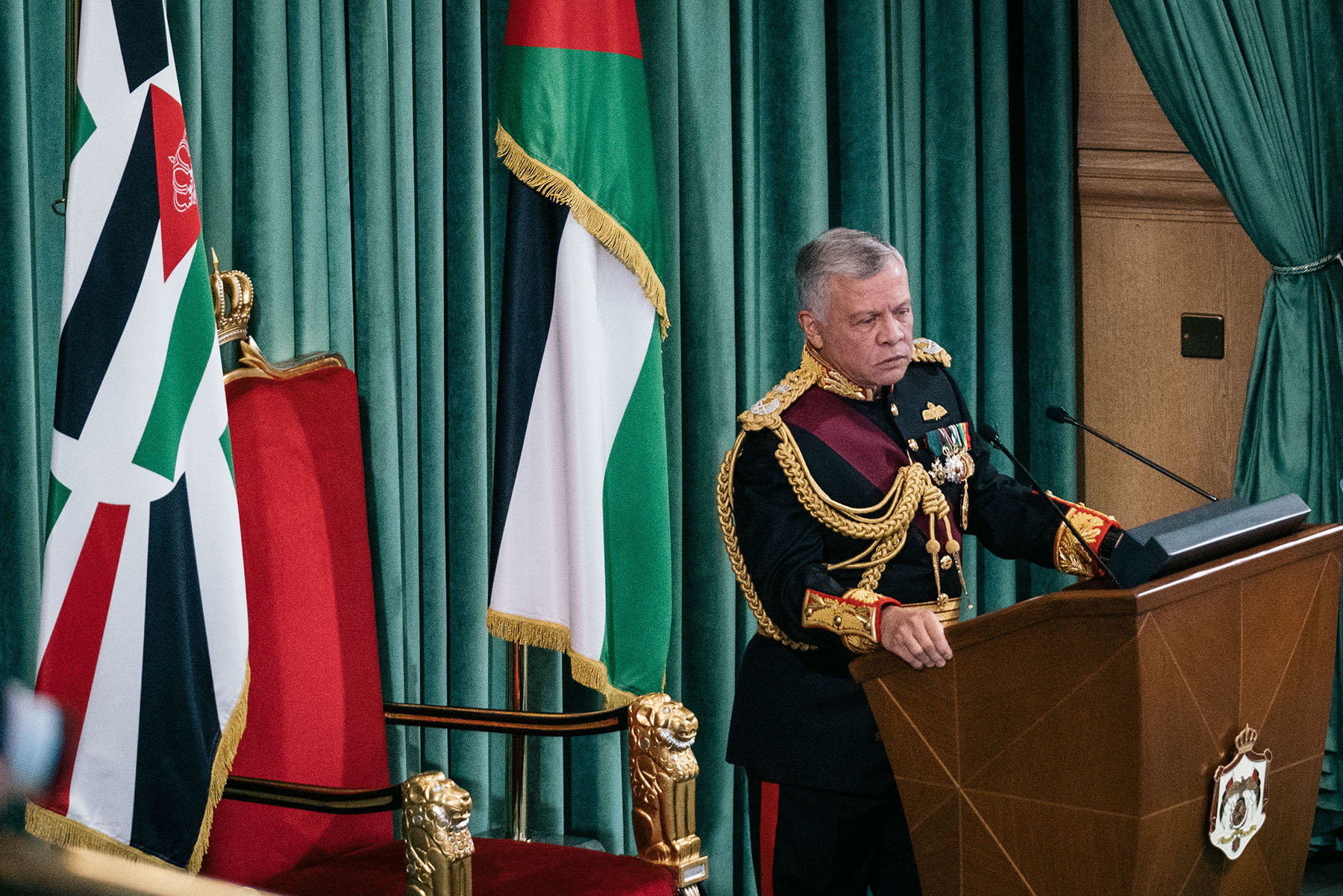International Aid Airdrops Demonstrate Extent of Israel's Hindrance of Critical Aid, are Inadequate to Avert Starvation, Genocide, Highlight Need for International Protection
(New York, March 2, 2024) – The United Nations Security Council (UNSC) should act urgently to establish an international protection force to safeguard Palestinian civilians and ensure the unobstructed delivery of humanitarian aid in Gaza as a last-ditch attempt to avert imminent starvation there, said DAWN on Saturday.
If the UNSC is impeded by a U.S. veto or fails to reach consensus, the U.N. General Assembly should reconvene the 10th session of "Uniting for Peace" and authorize such a force itself. Recent airdrops of aid, now with the participation of the U.S. Air Force, are inadequate to meet the ongoing catastrophe in Gaza and signal the availability of international military forces to help stabilize the situation.
"We urgently need the UNSC to authorize an international protection force to ensure the safe and effective delivery of food to starving Palestinian men, women, and children, just as it has done in other situations of catastrophic conflicts," said Sarah Leah Whitson, Executive Director of DAWN. "Tragically, without such intervention, it has become clear that Israel will continue to deliberately block such aid, which is the sole cause of the starvation and imminent famine in Gaza."
Massacre of Civilians Seeking Aid, Imminent Famine, as Israel Uses Starvation as a Weapon of War
On February 29, at least 117 Palestinians were killed, and more than 750 others were injured after Israeli troops opened fire on civilians gathered at a convoy of food trucks southwest of Gaza City, highlighting both the desperation of the starving civilian population and their inability to safely access humanitarian aid. International humanitarian organizations have halted all aid delivery to northern Gaza for nearly two weeks due to the lack of security, which is a direct result of actions and policies of the Israeli military, including targeting Palestinian police forces attempting to secure aid delivery. The Biden Administration reportedly warned Israel last week that as a direct result of its actions, "Gaza is turning into Mogadishu." The same day, the U.N. Security Council met in an emergency session called by Algeria on what is now being described as the "flour massacre," but members failed to agree on a statement about the deaths and injuries of civilians seeking aid.
At a meeting of the UNSC this week under the auspices of UNSC Resolution 2417, U.N. agencies warned that at least 576,000 people in Gaza are facing famine-like conditions. The U.N. World Food Program noted that there will be an "inevitable famine" in the besieged Palestinian enclave, amid increasing reports of children dying of starvation as Israel continues to hinder aid delivery to the population. Gaza is seeing "the worst level of child malnutrition anywhere in the world," Carl Skau, deputy head of the World Food Program, told the U.N. Security Council on February 28, with one child in every six under the age of two acutely malnourished. "Civilians and aid groups have described food shortages so dire that people were turning to leaves and bird food and other types of animal feed for sustenance."
A new World Bank report has found that Gaza's total economic output had shriveled by more than 80 percent in the last quarter of 2023, 80 to 96 percent of Gaza's agricultural infrastructure has been damaged or destroyed, and about 80 percent of Gazans have lost their jobs. Since the start of the war in Gaza on October 9, Israel's retaliatory bombardment and ground offensive have killed more than 30,000, over 10,000 of whom are children, and injured more than 70,000 people.
"The whole world is watching in horror as Israel is deliberately starving Palestinians, not only impeding the delivery of aid but actually firing and killing people desperately trying to obtain a few sacks of flour," said Whitson. "If the international community doesn't have the guts to hold Israel accountable for its atrocities and end this grotesque, genocidal assault on Palestinian civilians, the very least it can do is establish a U.N. protection force to ensure the safe delivery of aid."
Aid deliveries have decreased to the Gaza Strip since the International Court of Justice ordered Israel to stop killing and injuring Palestinians and to ensure the provision of humanitarian aid. Human Rights Watch recently documented how the Israeli government is using starvation of civilians as a method of warfare in Gaza, deliberately blocking the delivery of water, food, and fuel, while willfully impeding humanitarian assistance, apparently razing agricultural areas, and depriving the civilian population of objects indispensable to their survival. "Israeli officials, including Defense Minister Yoav Gallant, National Security Minister Itamar Ben-Gvir, and Energy Minister Israel Katz have made public statements expressing their aim to deprive civilians in Gaza of food, water and fuel – statements reflecting a policy being carried out by Israeli forces. Other Israeli officials have publicly stated that humanitarian aid to Gaza would be conditioned either on the release of hostages unlawfully held by Hamas or Hamas' destruction." Prime Minister Benjamin Netanyahu recently bragged about only allowing the absolute minimal amount of aid into Gaza.
Nebal Farsakh, the spokesperson for the Palestine Red Crescent Society, said that the IDF has targeted multiple aid convoys near the Rafah Crossing in Gaza. Police officers in Gaza usually help to secure the aid convoys entering Rafah City as well as those en route to the north and prevent them from being looted, but that is no longer the case since the IDF started targeting them, Farsakh said.
International Airdrops of Aid
Since early in the war, Jordan and several other countries have been airdropping aid into Gaza, in an effort to ensure that at least some aid can reach the civilian population there. On March 2, U.S. military forces carried out airdrops of their own, as three USAF C-130s dropped 66 bundles of food, but no water or medical supplies.
However, as international aid groups have warned, such airdrops are inefficient and insufficient to meet the dire needs of the Gazan population and starkly highlight the urgent necessity for international protection forces to address the crisis in Gaza. In fact, such airdrops demonstrate the failure of the international community to deliver aid in any effective way. "Airdrops do not and cannot substitute for humanitarian access," the International Rescue Committee, a New York-based aid organization, said in a statement on Saturday. "Airdrops are not the solution to relieve this suffering, and distract time and effort from proven solutions to help at scale." Richard Gowan, the International Crisis Group's U.N. director, said on social media: "Humanitarian workers always complain that airdrops are good photo opportunities but a lousy way to deliver aid."
"Everyone in the world knows that half-measures such as airdrops scattering little bundles of aid will do nothing to halt the imminent famine in Gaza and nothing to end Israel's ruthless, brazen obstruction of food, water, and critical medicine to the Palestinian population there," said Michael Schaeffer Omer-Man, DAWN's Research Director for Palestine. "While the U.S. may think it will score some brownie points for appearing to help Palestinians in need, airdrops won't begin to offset the fact that it continues to provide Israel with unlimited military support and political protection to carry out its atrocities, including using starvation as a weapon of war."
International Force
The UNSC should act urgently to establish an international protection force to safeguard the lives of Palestinian civilians in Gaza from violence and starvation and ensure the unimpeded delivery of humanitarian aid through established channels, to be deployed within 30 days. The primary functions of such a peacekeeping or international protection force should be to securely facilitate the immediate and unimpeded delivery of humanitarian aid, assistance, and reconstruction materials. This force also could act as a neutral intermediary to monitor and report on any violations of international law in support of the ongoing investigations of the International Criminal Court and the International Court of Justice, ensuring at least some measure of accountability and transparency. Such a force could also begin disarmament efforts and begin the process of building a new Palestinian security force to restore order once the U.N. mission is complete.
"We cannot stand by and sit on our hands as we watch the Palestinians in Gaza who have survived Israel's unprecedented bombing campaign starve to death," said Raed Jarrar, advocacy director for DAWN. "Countries are already using their military forces to airdrop aid, and they should now use their military forces to establish a genuine, effective peacekeeping force."
The UNSC has specific authority to take action under UNSC Resolution 2417, unanimously passed in 2018, which is designed to trigger action from the Council when there is a risk of conflict-induced famine affecting civilian populations. It authorizes the UNSC to take appropriate steps to ensure safe and unimpeded access to humanitarian aid and to sanction states, like Israel, unlawfully denying such aid. Such steps can and should include establishing a protection force in Gaza under Chapter VI of the U.N. Charter, mandating it with civilian protection, law and order, and overseeing the reconstruction of Gaza under Palestinian and international oversight.
If such a measure faces a U.S. veto or if the UNSC is again paralyzed due to the many such vetoes — or threatened vetoes — the U.S. has cast to preserve Israeli impunity, member states should introduce a U.N. General Assembly resolution (under "Uniting for Peace" resolution of November 1950 [resolution 377 (V)]) to establish a Chapter VI peacekeeping force in Gaza. The Uniting for Peace resolution stipulates that "if the Security Council, because of lack of unanimity of the permanent members, fails to exercise its primary responsibility for the maintenance of international peace and security in any case where there appears to be a threat to the peace, breach of the peace or act of aggression, the General Assembly shall consider the matter immediately…"
The U.N. General Assembly has met under the auspices of Uniting for Peace eleven times, going back as far as the 1956 Sinai campaign, which resulted in the deployment of the first United Nations Emergency Force (UNEF I). The Tenth Session of Uniting for Peace is still active and was last convened in December 2023 to address the crisis in Gaza and demand an immediate ceasefire. If the Security Council is unable to advance immediate and decisive action, the UNGA must reconvene the 10th session once again.
There is extensive precedent for the establishment of international protection forces to avert humanitarian catastrophe and ensure the safety and security of civilians under attack, even amidst ongoing wars. In 1999, the UNSC established the Kosovo Force (KFOR), when peacekeeping forces arrived on the ground in Kosovo within 90 days of the establishment of the peacekeeping operation. In 1992, the UNSC established the United Nations Protection Force (UNPROFOR) "to create the conditions of peace and security required for the negotiation of an overall settlement of the Yugoslav crisis." In 1974, the UNSC authorized the United Nations Disengagement Observer Force (UNDOF) "to maintain the ceasefire between the Israeli and Syrian forces and to supervise the implementation of the disengagement agreement." The UNSC has also authorized the African Union Mission in Somalia (AMISOM) several times to act as a protection force there since 2006. In 2001, the UNSC authorized the International Security Assistance Force (ISAF) in Afghanistan "to enable the Afghan government to provide effective security across the country and develop new Afghan security forces." The U.N. Department of Peace Operations currently has 11 active peacekeeping operations.






































